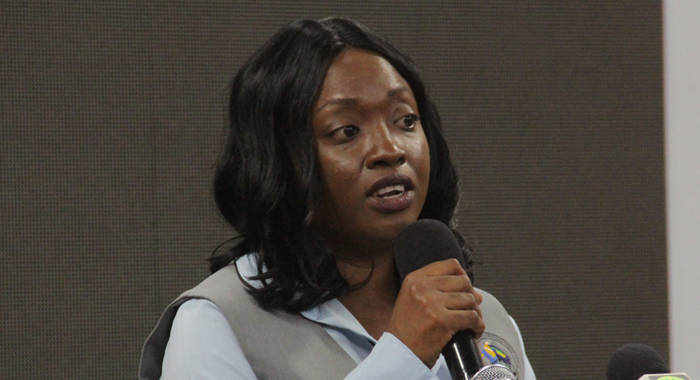Acting Director of Public Prosecution, Sejilla McDowall, on Friday, praised the efforts of the media in informing the public of what transpires in court, but cautioned against prejudicing matters before the court.
McDowall’s comments, however, seem aimed at a section of the media where commentary is rife, but attendance at court is low: radio.
The acting DPP told the closing of the criminal assizes at the High Court, in Kingstown, that she commends and recognises the efforts of the media, that whatever occurs in the courtroom is “accurately reflected, and also sounded a word to the media to ensure that they take every measure possible to avoid prejudicing matters that are before the court.
“There is like an open sepulchre and it needs to be dammed and I am urging the media personnel, those who are here and those who are not, those who are on the radio and are not under the sound of my voice, I am hoping that they are well aware that is it more harmful than good to be encouraging discourse on matter that cannot sometimes be confirmed.”
She said radio personnel sometimes “generate a body of facts that are at variance with evidence and they are commenting on hardships of witnesses out there.
“It is hard enough, especially in sexual offence cases, to go through an ordeal, the worst thing to me is just to imagine, because I have not been a victim, and I hope I will never be but these are things that are inescapable. Nobody volunteers and say, ‘Pick me. I want to be a victim of a sexual offence.’
“But people who encounter these horrid ordeals would not have to live through hearing Monday morning — I don’t want to be specific — Monday morning radio using their Monday morning radio time to rehash things that are unpleasant. I think that is cruel and harsh treatment.”
McDowall implored the media to be “a bit more sensitive, especially mindful that matters that [have] not [been] settled by the court relate to persons who are accused”.
She said there is a distinct line between someone who is accused and somebody who is convicted.
“Let us not blur the lines, let us not establish courts of public opinion; let’s just shut down some of those courts all together.”
The acting DPP said she was not saying that opinion should not be expressed.
“But let us engender an atmosphere where there could be fair comment as opposed to all of the tribalism and the harshness that is being ventilated out there.”
She said she was making the appeal on behalf of witnesses and the National Prosecutions Service, which she said is “a ministry of justice”.
“We are not out with our pitch forks, hoping that persons would perish, but what we are seeking is to ensure that justice is done and persons are held accountable for acts or omissions that are against the laws of St. Vincent and the Grenadines.”
Speaking during the same sitting, High Court judge Justice Brian Cottle expressed appreciation to the media present telling them that they do important work.
“But you must do that work with great care,” the judge said.
He said he was disappointed when the court arranged a training seminar — on Sept. 13 — on the sentencing guidelines that so few of the media practitioners who had been invited found the time to attend.
“But that is what it is,” the judge said.
Only three media practitioners attended the event, in Kingstown, which had been planned months in advance, but had been postponed on a number of occasions.
The acting DPP has earlier said that she knows that the courtroom can only seat so many persons but “there are a lot of persons who would express opinions, some of whom have never set foot in the court room, some of them who are very disgruntled about the sentencing guideline applications”.
McDowall expressed hope that as more sentences are handed down, “persons would take the opportunity to sit and to digest the particular approach to sentencing rather than reacting to what is published in the media.
“I know that the society would benefit when there is an appreciation of what this criminal justice system is about and that could only be achieved when open justice becomes a lot more real to Vincentians, when persons feel comfortable coming here and knowing that this is a classroom where they sit and listen to criminal cases,” the acting DPP said.
Speaking on behalf of the private bar, defence Counsel Jomo Thomas commended Justice Cottle for the way in which he elaborates his reasons for arriving at a particular sentence in each case.






